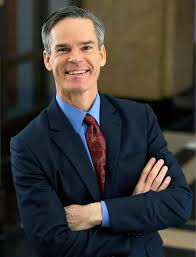Evan Falchuk, a health care executive and founder of the United Independent Party who has been stuck in the low single-digits since entering the race last year, and Jeff McCormick, a founding partner in a venture capital firm, are lagging far behind Democrat Martha Coakley and Republican Charlie Baker in the Globe’s poll, with Falchuk polling a negligible two percent and McCormick, who had been consistently polling between 5 and 6 percent — one fairly recent poll placed him as high as 7 percent — slipping to a mere one percent.
Both candidates also trail conservative pastor Scott Lively, a third independent in the race. The controversial Springfield preacher was favored by three percent of those surveyed.
Falchuk has sunk a whopping $1,495,000 into his struggling campaign, including a $50,000 contribution last Thursday, while the deep-pocketed McCormick has invested a total of $1,150,000 into his long-shot bid for the governor’s office, including loans amounting to $200,000.
Anti-gay activist Scott Lively, by contrast, has only raised $25,043.79 as of yesterday.
Making matters worse, McCormick’s campaign — once regarded as the more promising of the two outside challengers — suffered a blow with the recent departure of two high-profile strategists.
Perhaps they saw the handwriting on the wall.
According to the Massachusetts Office of Campaign and Political Finance, McCormick’s last investment in his campaign occurred on August 27th — nearly a month ago — when he plunked down an additional $200,000.
The 44-year-old Falchuk, who yesterday sharply criticized a Boston Globe editorial suggesting that the upcoming gubernatorial debates be limited to only the two major-party candidates, calling the paper’s editorial a “form of exclusionary – and outdated – snobbery,” seems to be waging a more public-spirited campaign than anyone else in the race. In July, the United Independent Party candidate urged all of his gubernatorial opponents to promise to introduce legislation overturning the Supreme Court’s disastrous and corrupting Citizens United decision, thereby curtailing the growing influence of Super PACs and unlimited corporate spending in political campaigns.
Given the slight margin between their major-party opponents — Coakley leads Baker by only three points, according to the Boston Globe — Falchuk and McCormick can still turn out to be major factors in the election’s outcome, but both candidates must be somewhat, if not deeply, disappointed at this stage in the campaign, particularly considering the kinds of personal investments they’ve made in terms of money, time and energy.





Pingback: Every State in New England Features Significant Alternative Candidates
Our structure as the way we degeinsd it constitutionally. I was not making a value statement, just stating that it was degeinsd as a two party system and will never be anything beyond that. The history of our party is extensive enough to demonstrate this, but if you want an example, the Greens, republicans, and democrats in 2000. Bush’s election has been blamed on Nader for years, and the hate by democrats of the Greens follows. Every time there is a third party, the minority wins the election because of vote splitting. The parliamentary system is set up to be more democratic because it is degeinsd to allow for more diversity in representation and for alliances to form between parties based on issues. Ours is set up to have a dominate voice and an oppositional one.Which is better? That is up to each person to decide, but if you want to establish a independent party’ you will have to replace one of the two already there. The Tea Party, for example, is considered a segment within the republicans, and the Blue Dogs are a segment within the Democrats. The Libertarians have had the greatest luck, but they generally pull the republican votes, meaning that they are simply replacing that party in the elections they win.